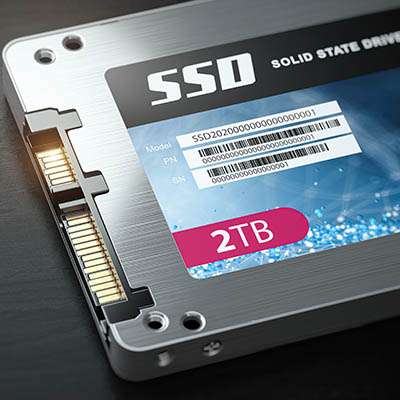Macro Systems Blog
Part Three: Storage Space
Storage space is the focus of the third part of our computer purchasing guide. As a general rule, modern gadgets have a few available options in terms of storage but the brand and version of the device can have an impact on the amount of space available. As you choose your desktop or laptop to buy, its storage capacity is absolutely imperative.
In the past few decades, data storage technology has jumped forward, as a brief comparison of capacity to time passed can show us. Take the standard 3.5-inch floppy disk, and its 1.44 MB capacity; while this was enough to contain large text files, it wasn’t even enough to hold an MP3 file on a single disk. Compare this to the typical CD, which can hold about 650 MB, or a DVD’s 4.7 GB storage limit, equal to that of 3,342 floppy disks.
A Blu-Ray disk can hold about 10 times as much as a DVD. Naturally, this is diminutive compared to Google’s total data storage capacity of over 15 exabytes. This equals approximately 15,000,000,000,000 megabytes, or about 10,416,666,666,667 floppy disks worth.
How Your Storage Requirements Vary by Intended Usage
Before you decide on a storage device to utilize, you need to consider what you will need from your solution. For example, if the computer we’ve been putting together is going to be introduced to your workplace’s network, it’s likely that there is a central location or cloud solution that is used as a primary data storage. In this scenario, your device won’t need much onboard storage; basically, just enough for the operating system, any non-cloud-hosted programs you use, and some extra space for file storage. You’ll want to invest a bit extra in your storage if your computer is for personal use or a home office, especially if you plan to use it for video production, as the specific files types involved will require dedicated storage.
The Difference Between HDD and SSD Storage
Your storage solution will be made up of at least one of these two kinds of devices: hard disk drives (HDDs), or solid-state drives (SSDs). Each have their pros and cons, which will come into play depending on your situation and your plans for your new device.
Hard Disk Drives
HDDs are the legacy storage components, having been used for three decades. By leveraging spinning magnetic platters and an arm to read data from and write data to this platter, they work quite similarly to a record player, albeit at a much, much, much faster speed.
While HDDs have high capacities, they aren’t the most energy-efficient, and tend to be very brittle, both reasons that laptops frequently eschew HDDs. Nonetheless, they are less expensive than the alternative.
Solid State Drives
SSDs don’t have any moving parts, with any and all data recorded electronically. While they have historically cost more than an HDD, there are many benefits to balance this out. They are hardier and more reliable than a hard disk drive, work faster, and deal with less wear over time because of their lack of moving parts, which cuts down on their failure rates.
The significant drawback to a solid-state drive is the cost/capacity ratio, and how fast higher-capacity drives can get to be expensive. For example: as of this writing, a HDD with 3 terabytes of storage costs less than a SSD with a third the storage.
Contemplating Your Storage Needs
As mentioned before, your required storage will depend on the intended use of the device. How much sense would including an SSD make? If your PC isn’t utilized for many intensive tasks, or your data is stored on the office network, you may be able to get away with as little as 128 or 256 GBs of storage.
If you’re designing a computer for your personal use, it makes more sense to invest a more into storage, getting between 512 GB and 1 TB. In some cases, this may not even impact the total price of the machine all that much, especially not compared to the impact of the CPU or RAM.
A desktop meant for a home office (without a server or network-attached storage device to keep data in) is probably going to require some extra storage space. Combining an SSD to run the operating system with a HDD for general data storage has been shown to be an effective strategy to get the most value from your new device. This setup would be especially beneficial to someone creating a gaming PC, as these detailed programs can quickly fill up vast amounts of storage. The same can be said for those who need to store a lot of media files, like photos, videos, or music, on the device. Even a casual user could find themselves running short on storage space unintentionally.
In Conclusion
Our recommendation is to use an SSD as your computer’s primary drive, potentially augmenting it with an additional HDD to ensure you have enough storage space for your files. As you weigh out your options, circumvent settling for the cheapest one out there; you’ll regret it if your data winds up lost. Naturally, whatever storage option you choose, you should always maintain a backup of your data.
Macro Systems can assist you with the steps of this series, helping you to acquire the computer that best fits your needs. Call us today at 703-359-9211.




Comments